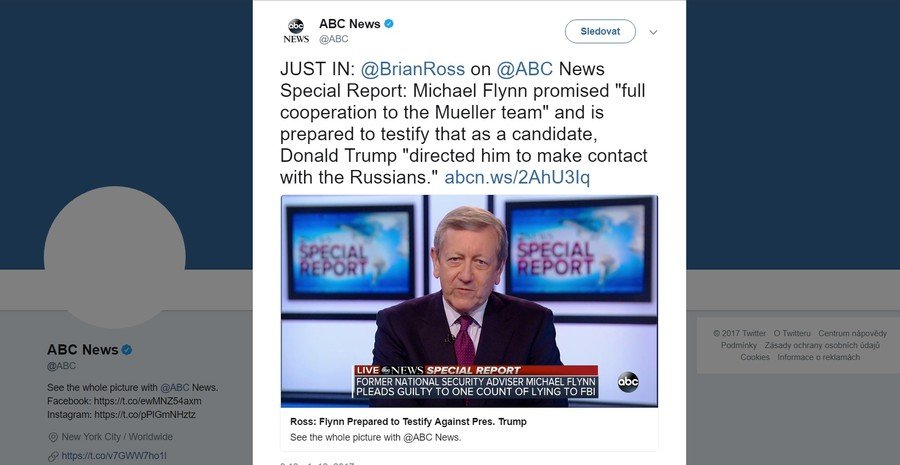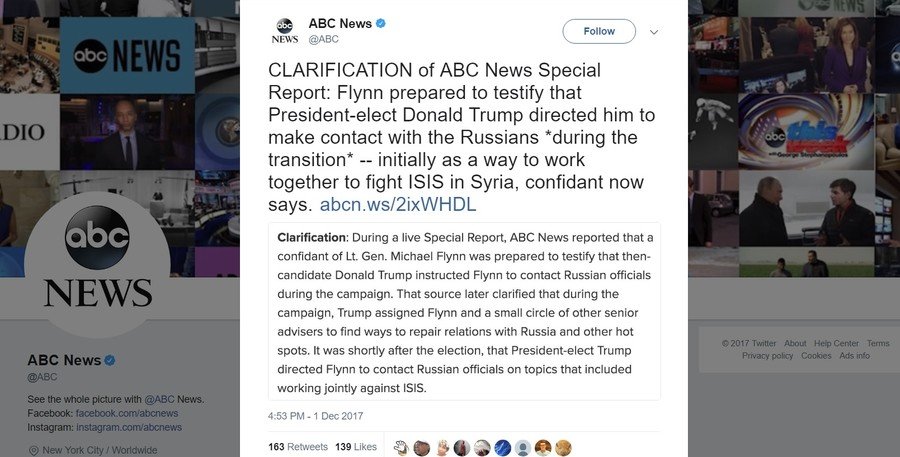Red faces, retractions & Russia-blaming: Fake news of 2017 (VIDEO)

Fake news stories on the Russia-Trump investigation dominated the western media agenda in 2017. Despite soon proven false, many of the reports were quickly amplified by other outlets and spread across social media.
The fake news for 2017 kicked off in January with reports that Russia’s hacking had extended to infiltrating the US House of Representatives.
C-SPAN hacked by Russians - Fortune
When C-SPAN’s live coverage of proceedings in the House of Representatives on the Securities and Exchange Commission (SEC) was interrupted by an RT newscast in January, panic ensued. Fortune led the media charge, reporting C-Span had confirmed it was a Russian hack.
C-SPAN Confirms It Was Briefly Hacked by Russian News Site https://t.co/NUFD662FMzpic.twitter.com/POstGFzvNE
— Fortune Tech (@FortuneTech) January 12, 2017
Other news organizations reported on the interruption, not going as far as to say it was the work of the Kremlin, but causing panic nonetheless.
READ MORE: RT broadcast interrupts C-SPAN live stream, sends Twitter into conspiracy craze (VIDEO)
C-SPAN released a statement saying it was “operating under the assumption that it was an internal issue,” and that “if that changes we will certainly let you know.”
— CSPAN (@cspan) January 12, 2017
Fortune updated its story with a correction: “This story originally ran under the headline ‘C-SPAN Confirms It Was Briefly Hacked by Russian News Site.’ C-SPAN confirmed that an interruption took place but has not yet identified the cause of the interruption.”
Comey to refute Trump’s claims – CNN
In June, CNN reported former FBI head James Comey was going to deny President Donald Trump’s claims that Comey had told him on three occasions that he was not under investigation.
James Comey is expected to refute President Trump during his Capitol Hill testimony. Read Nightcap https://t.co/cW9VscJrHQpic.twitter.com/ISKZrM50U9
— CNN Politics (@CNNPolitics) June 6, 2017
The network reported Comey was expected to make the denial in his prepared testimony to the Senate Select Intelligence Committee.
“Comey is going to dispute the president on this point if he’s asked about it by senators, and we have to assume that he will be," Gloria Borger, one of the four authors of the report explained on air, the Hill reported. "He will say he never assured Donald Trump that he was not under investigation, that that would have been improper for him to do so.”
Comey expected to refute Trump, sources say https://t.co/nZKgLEE0zA#abc15pic.twitter.com/tlNhoWDaaa
— ABC15 Arizona (@abc15) June 7, 2017
However, CNN was forced to correct this after Comey’s testimony was released before he appeared in front of the committee. It outlined three conversations he had with Trump in which he assured him he was not personally under investigation.
CNN changed its headline from, ‘Comey expected to refute Trump,’ to ‘Comey unlikely to judge on obstruction,’ and included the following correction: “The article and headline have been corrected to reflect that Comey does not directly dispute that Trump was told multiple times he was not under investigation in his prepared testimony released after this story was published.”
READ MORE: CNN spills the beans: 'Russiagate is fake, Trump being demonized'
The Washington Post aptly reported at the time, ‘CNN succumbs to its own Comey hype,’ although it defended the network’s false report, saying it was “not fake news, just wrong news.”
Scaramucci ties to Kremlin bank – CNN
CNN was forced to retract a second story in June, after it connected Trump’s former communications director Anthony Scaramucci to a Russian Direct Investment Fund managed by a Kremlin-controlled bank on June 22. It reported Senate investigators were looking at the fund in connection to Scaramucci, a former hedge fund manager, and other Trump associates.
An editor's note from CNN https://t.co/YssSkRP9C5pic.twitter.com/LrS7L3nz5R
— CNN Politics (@CNNPolitics) June 24, 2017
Three journalists resigned on June 27 after the network retracted the story, which had reported “Congress was investigating a Russian investment fund with ties to Trump officials,” based on an anonymous source.
"In the aftermath of the retraction of a story published on CNN.com, CNN has accepted the resignations of the employees involved in the story's publication," the network said.
.@CNN did the right thing. Classy move. Apology accepted. Everyone makes mistakes. Moving on. https://t.co/lyVajCKNHx
— Anthony Scaramucci (@Scaramucci) June 24, 2017
Russians hacked 21 states’ election voting systems – USA Today, MSNBC, AP
In September, it was reported by USA Today and others that the “Russians attempted to hack elections systems in 21 states in the run-up to last year’s presidential election.”
JUST IN: “Russian government cyber actors” unsuccessfully attempted to hack 2016 election results in Wisconsin, DHS tells state officials pic.twitter.com/PMd6Gj5z4b
— NBC Politics (@NBCPolitics) September 22, 2017
AP, which ran with the headline, “Federal government notifies 21 states of election hacking,” on September 23, said “election officials in several states said the attempts were linked to Russia.”
MSNBC’s Rachel Maddow told viewers the Russian hackers were “targeting their election infrastructure.”
DHS didn't bother to tell the 21 states Russia tried to hack during the election until this afternoon. https://t.co/48CNZL8MBp
— Maddow Blog (@MaddowBlog) September 23, 2017
The reports said the Department of Homeland Security told the affected states, citing Director of Wisconsin Elections Commission Michael Haas, who said it was the work of “Russian government cyber actors."
It later emerged the story didn’t hold up. AP reported Wisconsin was told by DHS that it didn’t have its systems targeted. DHS then said an agency not related to the election process had been scanned by Russian IP addresses.
California’s Secretary of State Alex Padilla issued a statement, saying DHS told his office “Russian cyber-actors” scanned California websites, including his own. When he asked DHS for more information “it became clear that DHS’ conclusions were wrong.”
DHS told the office Russian scanning took place on the California Department of Technology network, Padilla said, adding, “California voters can further rest assured that the California Secretary of State elections infrastructure and websites were not hacked or breached by Russian cyber actors.”
Feds now say Russians did NOT hack Wisconsin’s voter registration system. https://t.co/n6d5iummvCpic.twitter.com/dGnwgBPBxD
— AP Central U.S. (@APCentralRegion) September 26, 2017
On September 27, AP reported DHS “now says Wisconsin elections not targeted.”
ABC – Flynn-Russia collusion
ABC’s on-air news report claiming Trump ordered General Michael Flynn to make contact with Russian officials during the 2016 election caused the stock market to plummet on December 1.

Investigative reporter Brian Ross said an anonymous source told him that an associate of Flynn was going to testify that Trump “directed him to make contact with the Russians” when he was a candidate during the election. A fairly juicy scoop indicating a relationship between a presidential candidate and a foreign government.
However, Ross later corrected his report to clarify that the source later told him that Trump was actually the president-elect at the time of the conversation.

ABC tweeted a ‘clarification’ saying, “Flynn prepared to testify that President-elect Donald Trump directed him to make contact with the Russians *during the transition*,” and not before Trump won the election.
READ MORE: ABC’s fake news about Flynn & Russia causes stocks to crash
REUTERS – Deutsche Bank Trump accounts
Also in December, Reuters and Bloomberg reported Special Counsel Robert Mueller subpoenaed Deutsche Bank for information on accounts relating to President Trump and his family members, with Reuters citing “a source close to the matter.”
WATCH: Mueller subpoenaed Deutsche Bank on Trump accounts - source https://t.co/jQAHkmxRhN via @ReutersTVpic.twitter.com/I8nNWj4RKy
— Reuters Top News (@Reuters) December 6, 2017
NEW: Reuters: U.S. Special Counsel Robert Mueller has asked @DeutscheBank for data on accounts held by President Trump and his family, a person close to the matter said on Tuesday. https://t.co/zG8APRMqaN
— Evan Rosenfeld (@Evan_Rosenfeld) December 5, 2017
Trump’s lawyers and the White House denied the reports. Bloomberg issued a correction, saying the subpoena related to records of people “affiliated with Trump.” AFP reported Trump’s former campaign chair Paul Manafort was the person in question, although this hasn’t been confirmed as neither Mueller nor the bank will comment. Manafort pled not guilty to charges including tax evasion and money laundering in October.
CNN – WikiLeaks email bombshell
CNN was left red-faced again after it reported on an alleged bombshell in the Trump-Russia story in December. The network’s ‘exclusive’ claimed the Trump campaign received an email with a decryption key and a website address to access WikiLeaks documents before they were released.
The email was sent on September 4, CNN said, citing “multiple sources,” one month before WikiLeaks began releasing the emails of Clinton campaign chair John Podesta and 10 days before it released another batch of emails from the Democratic National Committee.
“This is just an increasing level of how closely tied the Trump campaign and then the Trump administration seem to be to these Russian contacts,” Rep. Jayapal says of an email showing an effort to give the Trump camp WikiLeaks docs https://t.co/0IAnl8tBPahttps://t.co/VWTV7ebBIG
— CNN Politics (@CNNPolitics) December 8, 2017
However, despite other networks also confirming the story themselves, it emerged that the date of the email was in fact September 14. As for the files, the link and key had been shared by WikiLeaks to its millions of followers on Twitter the day before.
To download the new DNC documents you need a "torrent" downloader such as "transmission" https://t.co/0g1sm1JxbATo unpack use "7zip"
— WikiLeaks (@wikileaks) September 13, 2016
CNN's initial reporting of the date on an email sent to members of the Trump campaign about Wikileaks documents, which was confirmed by two sources to CNN, was incorrect. We have updated our story to include the correct date, and present the proper context for the timing of email
— CNN Communications (@CNNPR) December 8, 2017
CORRECTION: Email to Trump and Trump Jr. from individual offering Wikileaks documents came Sept. 14 -- not Sept. 4 -- as we reported earlier. Email pointed to docs Trump camp could get publicly. https://t.co/4FOdCebgQL
— Manu Raju (@mkraju) December 8, 2017
It isn’t clear how so many news organizations got it wrong so many times in 2017, but the inaccurate reports all push the narrative that the Russians hacked the elections and colluded with Trump’s campaign.
Another element that emerges is the suggestion that the journalists in question may have been fed bad information, as many of the media reports came from anonymous, likely insider, sources.












